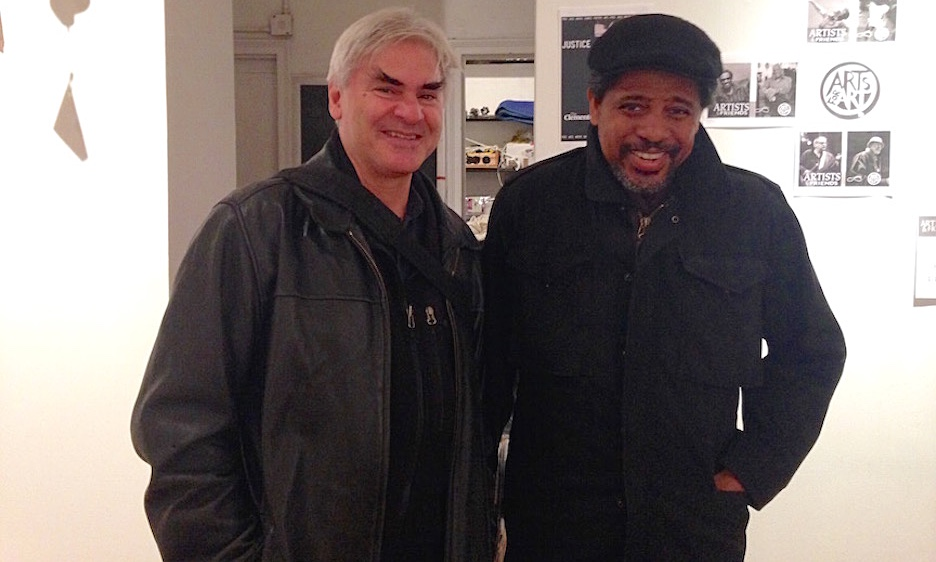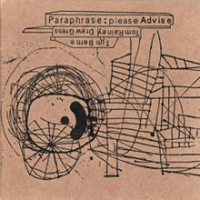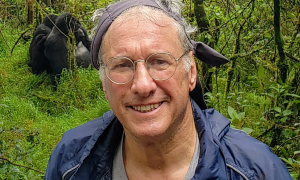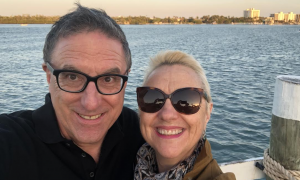Home » Jazz Articles » Out and About: The Super Fans » Meet Maurice Edwards
Meet Maurice Edwards

It gave new meaning to the word "dive." I wouldn't go into the bathroom without a tetanus shot. But I saw some serious sets there.
—Maurice Edwards
Tell us a bit about yourself.
I grew up in Harlem, and spent most of my life there, except for twelve years on Roosevelt Island. My childhood was no different than most people's. The only difference was that while other people were listening to pop, I was listening to jazz.
I've been a computer programmer for the New York City Department of Education for almost twenty-nine years. It has its positive moments, but it's not something I live for, like music.
Was there one album or experience that was your doorway to jazz?
It wasn't one thing; it was a process that began when I was eight or nine years old and heard Gillespiana, which piqued my interest. I guess it was the first time I'd ever heard a big band on a recording. And the arrangements were cool! I can't explain why they were cool, but they hit a nerve.
As time went on I heard albums by Carmen McRae, Gloria Lynne, and Clifford Brown, which increased my level of interest. There was this one Gloria Lynne tune, "Joey, Joey, Joey." So I'm thinking to myself, "Well, it's about a guy named Joey." She goes on singing about him, backed up by a trio and a few horns, and her phrasing is great. I heard that song numerous times. My parents loved Gloria Lynne to death. Plus another song where she sings about how she's "All Alone by the telephone" with such conviction, it was like, "Okay, I believe you—you're all alone by the telephone!"
At the age of 14, I made the decision to make a genuine effort to learn as much about the music as I could. This decision was based on three exceptional recordings: Red Clay by Freddie Hubbard; Gula Matari by Quincy Jones, and Grant Green's Green is Beautiful. After hearing those, I decided that this was a road I had to go down.
For the next three years it was a struggle, because it wasn't like I got it when I heard those three recordings. There were setbacks, and a huge learning curve I had to overcome. I heard some recordings I didn't get at all. There were times when I'd get the theme, but the improvisation left me cold, and sometimes it was the reverse: the theme wasn't much, but the improvisation reached me.
Why did you keep listening to improvised music if it was so challenging?
It was blind faith. I was going to follow this through. There were moments when I wanted to say, "Hell, I'll just listen to funk." And then I'd hear something amazing that I could immediately connect with, and that would inspire me to keep going.
The breakthrough occurred at seventeen years old, because of a handful of recordings, and one live performance: Charles Mingus at Carnegie Hall with an all-star band featuring Rahsaan Roland Kirk. And I remember there was a young guy, nineteen years old, a prodigy—it was Jon Faddis.
The Mahavishnu Orchestra also played a role in my understanding, which is ironic, because it's a fusion group. But it had an impact and helped me break the code. And there were Blue Note and CTI recordings that played a tremendous role in my education. A couple that come to mind are Lee Morgan's Live at the Lighthouse and Herbie Hancock's Maiden Voyage. From there it was off to the races, and I haven't looked back since.
How old were you when you got your first jazz record?
I'd say I was seventeen. One of the first I remember purchasing was a Blue Note compilation of recordings Kenny Burrell did in the 1950s with Candido Camero, Hank Mobley, and others. It was a crapshoot. I looked at the back of the album and saw some names I recognized, like Paul Chambers, Kenny Clarke, Kenny Dorham, as well as some names I didn't recognize. I'd heard Kenny Burrell a couple times on the radio, and I said to myself, "Hey, let me learn more about this guy." And then when I put the needle to the vinyl I was completely blown away. I was familiar with John McLaughlin's playing, Wes Montgomery's, George Benson's. Burrell's playing was different. His tone, his phrasing...I'm not saying it was better, but it was different, and he was clearly influential.
Some other recordings I bought during that breakthrough period were Joe Farrell's Moon Germs and Outback on CTI, and Dave Holland's Conference of the Birds.
What was the first jazz concert you ever attended?
I was sixteen years old, and it was at the Beacon Theatre on the Upper West side: Yusef Lateef opened, followed by Stanley Turrentine and his group, and then Roland Kirk and his group. The main thing I remember is there were a lot of drugs (and being pretty out of it part of the time!). But I also remember having difficulty connecting with the performers because I really didn't have a full understanding of what the music was about. At that time there was a learning curve that was formidable. But I didn't let that discourage me; I felt confident that at some point I was going to "break the code.'" And that's what started to happen to me at that concert. There were times when I thought, "Where are these guys going?" and other times when I got it. The concert was kind of representative of the learning process I was going through.
What do you mean by "break the code" ?
I can't think of a better way to describe what my goal was. I was trying to understand this form of artistic expression. I guess it's like learning a language that has several dialects.
How long have you been going out to hear live music?
44 years.
How often do you go out to hear live music?
On average I get to about seven or eight gigs a month.
What are the elements of an amazing concert?
For me there are only two things. The first one is clear communication. Each member of the group must communicate clearly with each other because without that, the exchange of ideas is not fluid. The second element is that each member of the group must have the capacity to express their emotions and thoughts through his or her instrument with a technical proficiency that is prodigious. It really comes down to that.
Is there one concert that got away that you still regret having missed?
In New York City there are going to be nights when you have to choose one great group over two or three groups that are equally great. There are going to be conflicts. So the regrets are a mile long.
Given my love for free improvisation, I also regret that I never went to the Knitting Factory and Tonic. Those would be the all-time venues for showcasing that music. I was told Charles Gayle had a series of Monday nights at the Knitting Factory. How the f.u.c.k. did I miss that?
If you could go back in time and hear one of the jazz legends perform live, who would it be?
I reject the question -if you're a [jazz] junkie, it's more than one person! I mean, my goodness, Louis Armstrong and the Hot Five, Thelonious Monk's group with Ahmed Abdul-Malik, Shadow Wilson, and John Coltrane.
Which clubs are you most regularly to be found at?
The Stone probably more than any other. Cornelia St. Café, Ibeam, Roulette, Barbes, The Clemente. And the mainstream clubs, the Village Vanguard, the Jazz Standard.
What's your favorite venue?
It's a no brainer. Firehouse 12 in New Haven, CT. Anyone who says otherwise, we'll have to agree to disagree. There are three reasons: First, they have chairs that are actually comfortable—and there's adequate space for your legs! Second, the venue is also a recording studio, and quite a few exceptional recordings have been made there. Finally, they have a kitchen, dining room, bathroom, and bedroom for artists who are performing or recording there and need a place to stay. After I was there the first time I felt embarrassed, as someone who lives in the jazz capital of the world, because there isn't a jazz venue in New York that's comparable to this. Not one. And it isn't like there aren't people who can come up with the money for it.
Is there a club that's no longer around that you miss the most?
It's kind of a love-hate thing with me with me, but the Douglass Street Collective in Brooklyn. It gave new meaning to the word "dive." I wouldn't go into the bathroom without a tetanus shot. But I saw some serious sets there.
How do you discover new artists?
Word of mouth. The DMG [Downtown Music Gallery] newsletter is invaluable. New York City Jazz Record is another invaluable resource. And Kevin Riley [of Relative Pitch Records] sends out a monthly list of the shows he's going to be attending.
Vinyl, CDs, MP3s, or streaming?
Without question, CDs. I can't even remember the last time I played my vinyl.
If you were a professional musician, which instrument would you play and why?
It's a toss-up between guitar and saxophone. When I think about the performances by musicians who've struck me to the core, guitar players and sax players come to mind. I love too many to name, but on guitar, Pat Martino, Nels Cline, Ralph Towner, Mary Halvorson, George Benson (before 1975), Wes Montgomery. Derek Bailey was like a microcosm of my struggles listening to jazz. I didn't get him right away; it took years, but when I cracked the code I couldn't get enough of the guy. And sax players: Charles Gayle, Sam Rivers, Tony Malaby, Dexter Gordon, Cannonball Adderley, Anthony Braxton, Charlie Parker.
What's your desert island disc?
I reject the question. It can't be just one. No. I reject the question!
What do you think keeps jazz alive and thriving?
I have no idea, and I don't think anyone else has an idea. Given the fact that jazz gets almost no financial support, it should have died decades ago. Lou Grassi made an excellent point: In a city of over eight million people jazz venues should be able to get at least one hundred people on any given night, but that's not the case.
Finish this sentence: Life without music would be...
A devastating blow to my capacity to deal with reality.
Tags
PREVIOUS / NEXT
Support All About Jazz
 All About Jazz has been a pillar of jazz since 1995, championing it as an art form and, more importantly, supporting the musicians who make it. Our enduring commitment has made "AAJ" one of the most culturally important websites of its kind, read by hundreds of thousands of fans, musicians and industry figures every month.
All About Jazz has been a pillar of jazz since 1995, championing it as an art form and, more importantly, supporting the musicians who make it. Our enduring commitment has made "AAJ" one of the most culturally important websites of its kind, read by hundreds of thousands of fans, musicians and industry figures every month.























